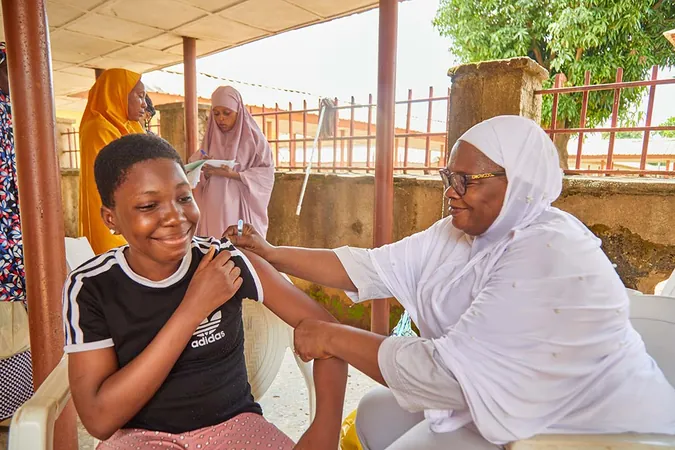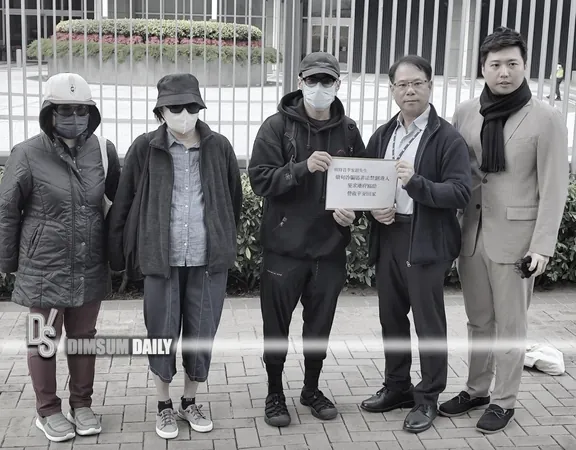
Unitaid and Gavi Join Forces to Combat Cervical Cancer in Low-Income Countries
2024-12-13
Author: Li
Geneva, December 13, 2024
In a groundbreaking initiative, Unitaid and Gavi, the Vaccine Alliance, have announced a partnership aimed at enhancing access to cervical cancer prevention through a pilot program that integrates cervical cancer screening and HPV vaccination. This initiative builds on existing projects in Côdte d’Ivoire and Nigeria, with a dual focus on increasing vaccination coverage and screening access for women and girls.
Cervical cancer remains one of the top killers of women globally, particularly in low- and middle-income countries where the lack of accessible vaccination, screening, and treatment options continues to pose significant challenges. In Sub-Saharan Africa, the situation is even more dire, compounded by a high prevalence of HIV, which heightens the risk of invasive cervical cancer by six-fold. In Cote d’Ivoire and Nigeria, cervical cancer ranks as the second most common cancer among women, with mortality rates alarmingly surpassing the global average.
The World Health Organization (WHO) has developed a global strategy to eliminate cervical cancer, targeting three essential pillars: vaccination, screening, and treatment. The collaboration between Gavi and Unitaid capitalizes on Gavi's expertise in vaccine distribution and Unitaid's innovative health solutions to address this health crisis. Their partnership reinforces the need for coordinated efforts identified as critical in WHO's strategy and aligns with the Lusaka Agenda's call for a united front among global health stakeholders.
In a bid to revive HPV vaccination efforts in low-income nations, Gavi, along with its partners, launched a campaign in 2022 focusing on revitalizing vaccination rates. Concurrently, Unitaid has been actively supporting both Cote d’Ivoire and Nigeria since 2020, ensuring that women who are unable to receive vaccinations still have access to life-saving screening and treatment options. Although significant strides have been made, the current coverage remains insufficient, necessitating more strategic actions to protect women and girls from cervical cancer.
The project, led by partners Expertise France (EF) and the Clinton Health Access Initiative (CHAI), aims to trial innovative pathways to boost vaccination rates for girls and screening accessibility for adult women. This effort includes enhanced service delivery models in schools, homes, and clinics, and is particularly focused on reaching both girls and their female caregivers. To tackle the cultural challenges that impede girls’ access to vaccinations, the initiative will undertake targeted health communication campaigns, acknowledging the influence of family and community decision-makers.
EF and CHAI will collaborate with health ministries in both countries to engage girls, educators, and caretakers through school-based health communication initiatives. Building on Unitaid’s successful outreach programs, the partnership will also explore home-based delivery of HPV vaccinations and distribution of self-collection testing kits for HPV screening where feasible. By utilizing existing healthcare infrastructures, including sites dedicated to HIV treatment, the program seeks to integrate cervical cancer prevention services into general health services, thus raising awareness and participation rates.
Dr. Philippe Duneton, Executive Director of Unitaid, stated, “This partnership harnesses two critical strategies—vaccination for young girls and comprehensive screening and treatment for unvaccinated women. We aim to confront the specific challenges faced by women and girls in these regions, generating insights that will inform effective community-based health strategies.
Dr. Sania Nishtar, CEO of Gavi, emphasized the importance of integrating immunization efforts into primary healthcare services, citing that HPV vaccination is an essential entry point to introducing other important health services.
Furthermore, Prebo Barango, a specialist at WHO, pointed out that providing comprehensive information and services to women and girls can significantly improve health literacy and service uptake, ultimately contributing to the cervical cancer elimination agenda.
Over the next year, this partnership will gather evidence on the viability, acceptability, and cost implications of these integrated cervical cancer prevention methods, aspiring to broaden these successful models to enhance access to preventive measures in other low- and middle-income nations.
Stay tuned for updates on how this vital initiative unfolds and its potential impact on global health!


 Brasil (PT)
Brasil (PT)
 Canada (EN)
Canada (EN)
 Chile (ES)
Chile (ES)
 España (ES)
España (ES)
 France (FR)
France (FR)
 Hong Kong (EN)
Hong Kong (EN)
 Italia (IT)
Italia (IT)
 日本 (JA)
日本 (JA)
 Magyarország (HU)
Magyarország (HU)
 Norge (NO)
Norge (NO)
 Polska (PL)
Polska (PL)
 Schweiz (DE)
Schweiz (DE)
 Singapore (EN)
Singapore (EN)
 Sverige (SV)
Sverige (SV)
 Suomi (FI)
Suomi (FI)
 Türkiye (TR)
Türkiye (TR)